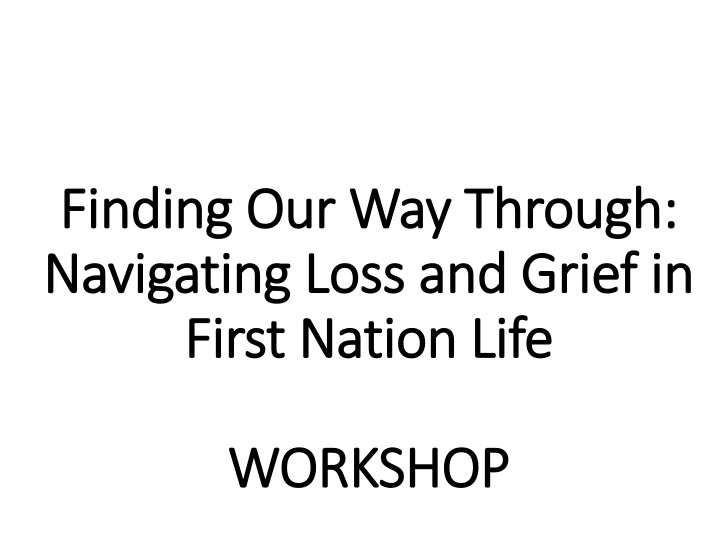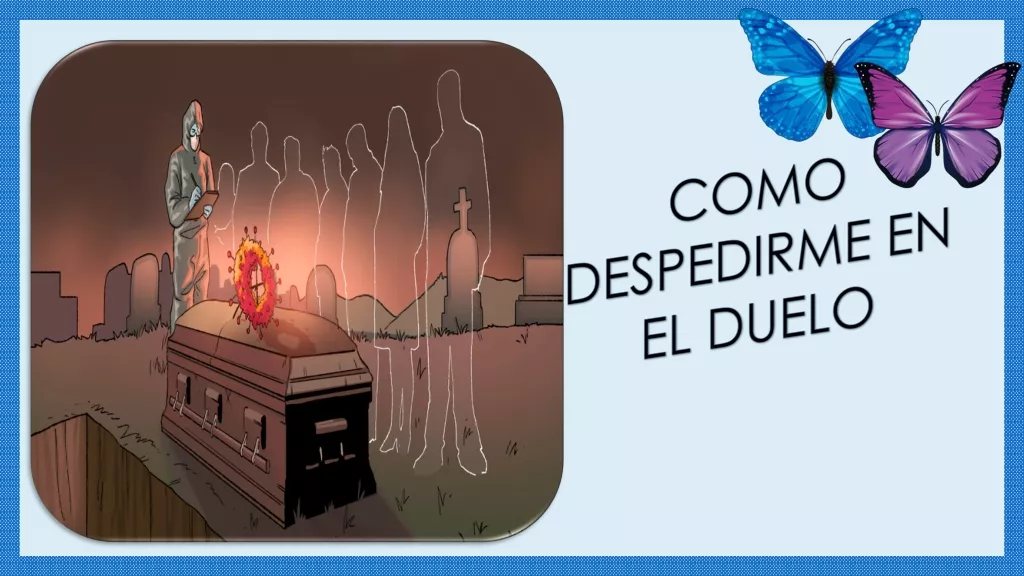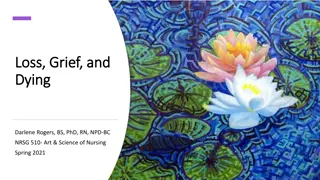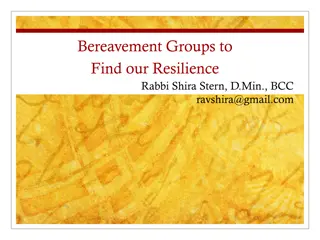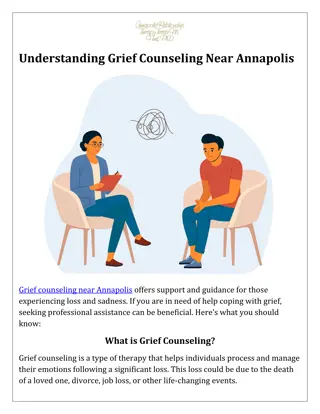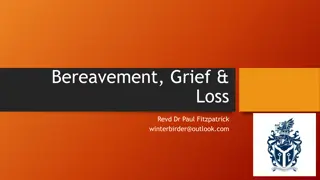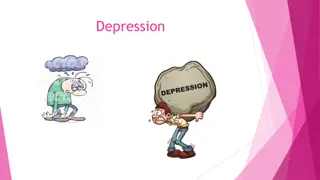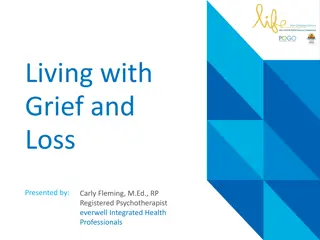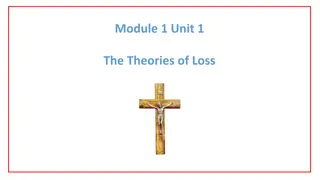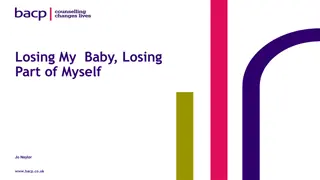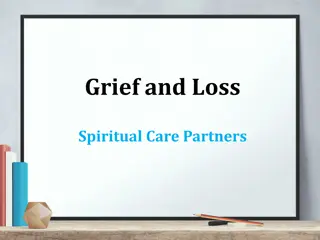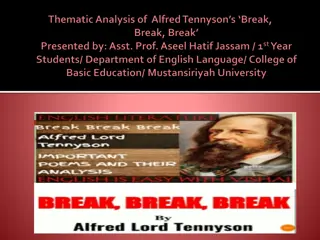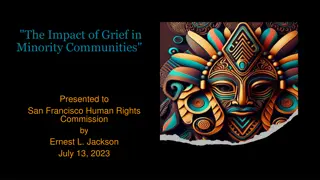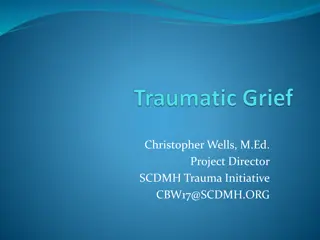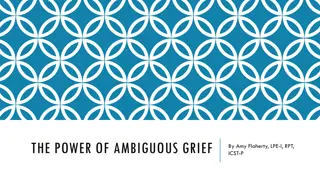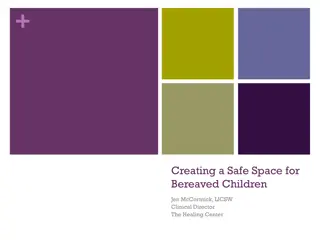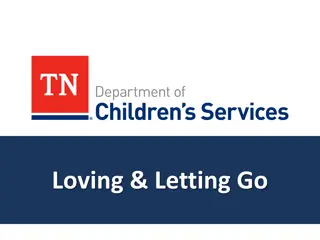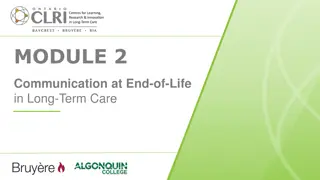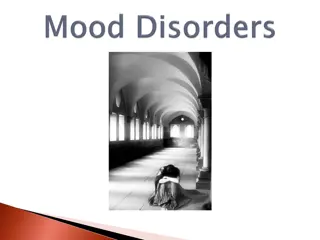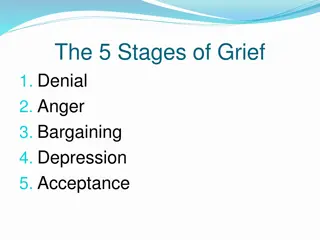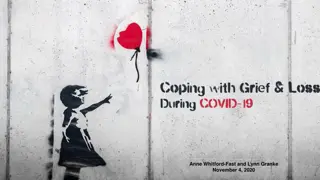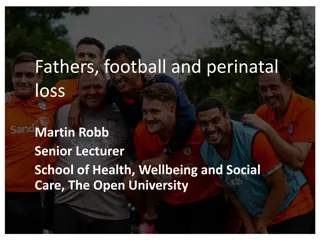Navigating Loss and Grief in First Nation Life Workshop
This workshop provides a culturally relevant and supportive environment for health care providers and others offering family support to explore loss, grief, and bereavement in First Nation communities. Participants will enhance their awareness, knowledge, and skills in reflective practice to process personal loss, grief, and trauma. The workshop aims to understand the unique characteristics of First Nations loss and grief, develop responses drawing on community strengths, and increase capacity to provide care within First Nation contexts.
Download Presentation

Please find below an Image/Link to download the presentation.
The content on the website is provided AS IS for your information and personal use only. It may not be sold, licensed, or shared on other websites without obtaining consent from the author.If you encounter any issues during the download, it is possible that the publisher has removed the file from their server.
You are allowed to download the files provided on this website for personal or commercial use, subject to the condition that they are used lawfully. All files are the property of their respective owners.
The content on the website is provided AS IS for your information and personal use only. It may not be sold, licensed, or shared on other websites without obtaining consent from the author.
E N D
Presentation Transcript
Finding Our Way Through: Finding Our Way Through: Navigating Loss and Grief in Navigating Loss and Grief in First Nation Life First Nation Life WORKSHOP WORKSHOP
Introductions Choose a partner it is best if it is someone you do not know well Introduce yourself to your partner, then switch and have the other person introduce themselves As part of the introduction, identify a personal strength you have that has helped you help another person through loss and grief Come back after 10 minutes and introduce your partner
Workshop Objectives: Day 1 1. To provide a culturally relevant and supportive environment for health care providers and others providing family support to explore First Nations loss, grief and bereavement. 2. To provide an opportunity to develop further awareness, knowledge and skills in reflective practice and processing of personal loss, grief and trauma.
Workshop Objectives: Day 2 1. To further understand the unique characteristics of First Nations loss and grief. 2. To develop options for helpful responses drawing on the strengths and capacities of First Nation communities. 3. To increase capacity to provide care with First Nations individuals, families and communities in their loss, grief, mourning and bereavement work.
Workshop Content (1/2) Day 1: The Personal Experience of Loss Loss, grief, bereavement and mourning Unique First Nation context for loss Personal process for grief work and self care
Workshop Content (2/2) Day 2: The Community Experience of Loss Cultural values, practices and protocols for loss and grief Strengths, challenges and processes in community Deeply reflective practice and connection to community
Workshop Process Overview Discussion of the creation of a circle of trust including commitment to respect, safety, support and confidentiality Roles and responsibilities Brief presentations, individual exercises, group circle talks and discussions Commitment to the awareness of triggers and individual and group responses Use of your personal journal to keep track of ideas, insights, thoughts or feelings throughout the workshop that you may want to work with later
Circle of Trust Relationships that are built on trust and respect not to turn away or try to fix Stay present to each other, witness another s experience while holding back on the urge to fix or offer solutions Face our own fears and witness others fear, pain and strength Trust that people must find their way or come to life in their own way and time
Characteristics of the Circle of Trust Unconditional loving presence a heart space not a head space a sacred space to honour the soul and its path Trust confidentiality Respect, patience and hope Faith in the person s ability to listen to their own inner voice (soul) and find their way through using their own truth and inner wisdom
Safe Space to Invite Inner Guidance Inner guidance only emerges into a quiet, safe and inviting space we need to sit quietly with one another and allow inner wisdom to come out Like accompanying a person at end of life The love that exists between two solitudes (people) that protect, border and salute each other to be alone together
Circle of Trust Development Discussion What do you need to feel comfortable and safe in this workshop? What other ground rules would help to form a strong circle of trust?
Roles and Responsibilities Discussion What are the roles and responsibilities of the facilitators? What are the roles and responsibilities of the participants?
Loss, Grief and Bereavement Loss change or loss of something or someone important in your life Bereavement is a state of being that encompasses grief and mourning Grief is a total human experience and a natural response to the loss of someone or something precious Mourning the sharing of grief with other humans, family and community who may include gatherings, ritual or ceremony to mark the loss
Grieving Grieving is a process that takes time. The process depends on the nature of the loss and the person and their situation. It may take many months or years after a death to fully resolve. Grieving may become complicated and depends on the person and their situation.
Physical / Body (1/4) Hollowness in stomach Tightness in chest Heart palpitations Cannot sleep Diarrhea, no appetite for food Tiredness Taking on symptoms from the deceased
Emotional / Heart (2/4) Anxiety (free floating fear not about anything specific) Depressed mood Numbness Sadness Fear Anger Guilt Relief Apathy not caring about anything
Mental / Mind (3/4) Disbelief experience does not seem real Confusion - foggy mind or forgetfulness Cannot concentrate or pay attention to anything for more than a few minutes
Spiritual /Spirit (4/4) Anger or questioning God or other religious or spiritual beliefs Taking another look at personal faith Searching for meaning of the loss
The Experience of Grief Discussion What are some of the experiences you have had with grief? How did you feel it mind, body, spirit, heart?
Phases of Grief Loss of a Loved One No set phases or stages or steps progress not in a line, more a spiral May differ depending on cultural, religious, spiritual or family background Uncomplicated grief related to a death may include: Anticipatory grief (before the death) Acute grief (weeks to months) which may include shock and numbness Anger, bargaining etc. Chronic phase (months to years) Reconciliation
Individual, Family and Community Connections Each individual has their own experience of grief and will work though the process coming to resolution in their own unique way. As families connect, each individual has their own experience and will be at their own place in the process it may not match up. As communities connect, again the unique set of experiences of each individual and within families need to be understood at the community level.
First Nation Loss, Grief, Bereavement and Mourning Community, family and cultural strengths Historical loss and trauma colonization; loss of land, language and culture; residential school and child apprehensions Today s reality many losses within extended families; high death rate; early, unexpected and traumatic or violent death and a backlog of unresolved grief Gender roles and the way men and women approach grief Spirituality and religion
Small Group Discussion Form small groups (4 or 5 per group) and share your personal experience of loss, grief and bereavement in family lives and working with others Engage in a discussion on the personal experiences and insights (45 minutes) Bring back highlights to the larger group
Self-awareness and the Process of Living We each have a unique process through which we grow, heal and live It is always moving and unfolding Living our process is the way we work through the pain of loss and grief Living in process is about allowing our experience to surface and expressing it as we heal and relearn wholeness Connection to the universal or spirituality is the source of energy for a successful process We each have a role in allowing our own process and contribute to others around us
Four Aspects of Energy We have mind, body, spirit and heart All four aspects need to work together and keep moving in order for life to carry on Sometimes in our grieving process we get stuck in one or more of these aspects and may need help to move along and get back in the flow of life and co- creation
Insights and Intentions Our insights what we see in ourselves help us to know if we are moving or not and what we need in the way of support Our intention guides the process and sometimes reality does not live up to what we intend
What People Experiencing Grief May Need To be accepted and not judged Allowed to express their acute grief in the way that best suits them, their individual beliefs and their cultural, religious or spiritual traditions Support from friends and family may need different types and levels to move through grief and adjust to the loss Time Information on normal and complicated grief Physical needs taken care of food, water, sleep, exercise Support for decision making as independently as possible Sometimes additional grief counselling talking about the loss, to express feelings, and monitoring for complicated grief
Complicated Grief Grief reactions that significantly affect the ability to function in your personal and work world for a prolonged period of time May involve problems such as severe anxiety or depression, intrusive and persistent thoughts, painful yearnings, excessive feelings of being alone and empty, avoiding tasks and reminders of the lost loved one, sleep problems Professional help is needed
Processing Grief Knowing when we have grief work to do Finding an effective process or set of processes Assessing progress Methods mainstream and cultural Complicated grief Additional supports
Understanding Grief: Ten Essential Touchstones (1/2) Open to the presence of your loss Dispel misconceptions about grief Embrace the uniqueness of your grief Explore your feelings of loss Recognize that you are not crazy
Understanding Grief: Ten Essential Touchstones (2/2) Understand the needs of mourning Nurture self Reach out for help Seek recognition, not resolution Appreciate your transformation
Journal Exercise Think about your own grieving processes Write down what worked and what did not work Reflect on what you do that works for self-care Put a star beside those ideas you would like to share Grief Exercise Grief Exercise Grief what are some of the thoughts and feelings that surfaced? Stuck what is your experience of being stuck or sidelined? Me- what kinds of people are in your circle family? friends? strangers? Love how is love shared in your life and others?
Day 2 Reflections How are you doing this morning? Share one significant learning or new awareness from yesterday. Tell us about your experience of the circle of trust. Anything you want changed or added for today?
Grief Mapping Exercise Debriefing Grief what are some of the thoughts and feelings that surfaced? Stuck what is your experience of being stuck or sidelined? Me what kinds of people are in your circle family? friends? strangers? Love how is love shared in your life- for self and others?
Cultural Values (1/2) Old and new life ways Similarities and differences Respect Sharing and caring Spirituality Connection with the land
Cultural Values (2/2) Interconnectedness Harmony and balance Extended family Collective Gender specific roles and responsibilities Gratitude
Cultural Practices and Protocols Communication, gender and relationships Expected behaviour Community visits and family events Cultural laws and practices
Discussion on Cultural Values, Practices and Protocols How do these or other values, practices and protocols take on life in your family or community? How does culture help at times of loss?
Questions for the Group 1. What is our experience as First Nation families, workplaces or community with loss and grief? 2. What are some of the strengths and life giving forces that we have to work with in building a healthier way to work through loss? 3. What are some of the challenges that we face in this area of loss and grief? 4. What is missing in our support systems for grieving, bereavement and mourning? 5. What ideas do we have on how things could be better in the future?
Cultural Competence Cultural Competence is the human relational capacity to seek and find compassionate understanding within, between and among people of differing cultural backgrounds and perspectives. (Hanson, 2009)
Deeply Reflective Practice and Building Relationships Learn to listen to yourself and learn from your experience Focus on building quality, caring relationships through self-awareness and reaching out Each person is respected and the circle of trust is developed Find ways to look at own issues and how they are reflected in your relationship with self and others mind, body, heart spirit Make time to think and feel deeply in reflecting on your experience Develop ways of building support and finding honest mirrors or people who care about us and are willing to provide feedback and debriefing support
Discussion on Experiences With Helping Others How have I helped others through loss or seen others provide help? What works and does not work? What kinds of support do I want for me and my family at the time of loss and grief?
Companioning (1/2) Companioning is: a life-giving, hope-filled model that incorporates the mind and body as well as the soul and spirit a companion to accompany, to associate, to comfort, to be familiar with sees death and grieving as a spiritual journey of the heart and soul assumes a continued relationship of memory beyond death seeks reconciliation not recovery rather than taking away normal symptoms it seeks to watch out for , to keep and honor , to bear witness
Companioning (2/2) Companioning understands that: mourning needs to occur in doses- at a pace their heads and hearts can manage the principles are: no rewards for speed ; not attached to outcome there is no destination divine momentum allow the process to flow as it is meant to - the process, all by itself, will lead to healing and reconciliation trust it open-heartedness is reflected in humility; unknowing; unconditional love; and readiness to receive a fellow human being
Tenants of Companioning the Bereaved (1/2) Companioning is about: being present to another person s pain; it is not about taking it away going into the wilderness of the soul with another human being; it is not thinking you are responsible for finding the way out honoring the spirit; it is not about focusing on the intellect listening with the heart; it is not about analyzing with the head bearing witness to the struggles of others; it is not about judging or directing these struggles
Tenants of Companioning the Bereaved (2/2) Companioning is about: walking alongside; it is not about leading or being led discovering the gifts of sacred silence; it does not mean filling every moment up with words being still; it not about frantic movement forward respecting disorder and confusion; it is not about imposing order and logic learning from others; it is not about teaching them curiosity; not about expertise
Reconciliation To be bereaved is to be torn apart reconciliation is about reconciling with a new normal Maslow s order physical needs (shelter, food, water, sleep); safety; love and belonging; esteem and self- actualization; transcendence. Reconstruction and reintegration begins at the ground with physical needs and moves up as time goes on; more in a spiral that moves around revisiting similar places and experiences than in a line with no going back
Self Care and Next Steps Discussion What do you plan to do for yourself to follow-up from the workshop? What support people or systems do you have in place to help? What new supports might you seek to build capacity for yourself and helping others? What do you see as next steps in self care and self compassion?
